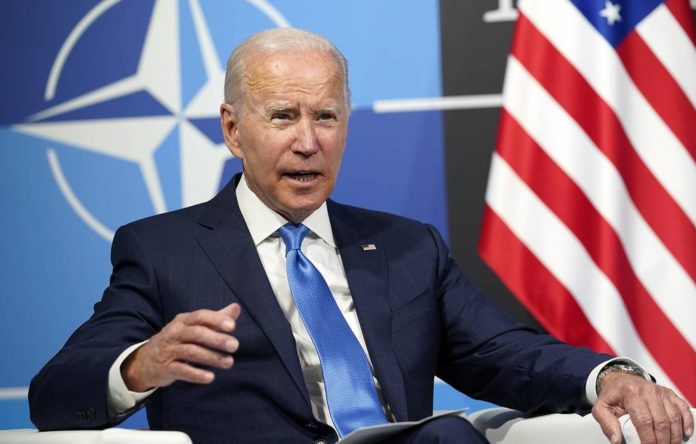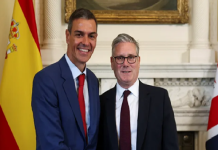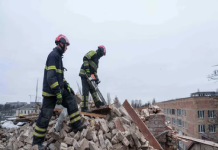
NEW YORK/KYIV, Oct 7 (Reuters) – Russian President Vladimir Putin’s threat to use nuclear weapons in Ukraine has brought the world closer to “Armageddon” than at any time since the Cold-War Cuban Missile Crisis, U.S. President Joe Biden said.
As Putin’s seven-month invasion unravels, Ukrainian President Volodymyr Zelenskiy said Kyiv’s forces were swiftly recapturing more territory, including more than 500 sq km in the south where they burst through a second major front this week.
Russia’s failings on the battlefield have brought unusual public recrimination from Kremlin allies, with one Russian-installed leader in occupied Ukrainian territory going so far as to suggest Putin’s defence minister should have shot himself.
Biden said the prospect of defeat could make Putin, who was 70 on Friday, desperate enough to use nuclear weapons, the biggest risk since U.S. President John Kennedy and Soviet leader Nikita Khrushchev faced off over missiles in Cuba in 1962.
“We have not faced the prospect of Armageddon since Kennedy and the Cuban missile crisis,” Biden said in New York. “For the first time since the Cuban Missile Crisis, we have a direct threat to the use of nuclear weapons, if in fact things continue down the path they’d been going.”
Putin was “not joking when he talks about potential use of tactical nuclear weapons or biological or chemical weapons, because his military is, you might say, is significantly underperforming,” Biden said.
Concern so far has been over the prospect of Russia deploying a so-called “tactical” nuclear weapon – a short-range device for use on the battlefield – rather than the “strategic” weapons on long-range missiles that Washington and Moscow have stockpiled since the Cold War.
But Biden suggested it made little difference: “I don’t think there’s any such thing as the ability to easily (use) a tactical nuclear weapon and not end up with Armageddon.”
Putin has warned he would use all means necessary, including Russia’s nuclear arsenal, to protect Russian soil, which he now says includes four Ukrainian regions he declared annexed last week.
In remarks to Australia’s Lowy Institute, Zelenskiy said NATO should launch preventive strikes on Russia to preclude its use of nuclear weapons.
Kremlin spokesman Dmitry Peskov denounced those comments as “an appeal to start yet another world war with unpredictable, monstrous consequences”. Russian Foreign Minister Sergei Lavrov said Zelenskiy’s remarks demonstrated why Russia was right to launch its operation.
‘WHAT HAVE YOU DONE?’
Putin signed a bill this week annexing Ukraine’s Donestk, Luhansk, Kherson and Zaporizhzhia regions, representing about 15% of the country, although none is fully under Russian control.
Ukrainian forces have advanced swiftly since bursting through the Russian front in the northeast at the start of September, and in the south this week.
Since Putin proclaimed the annexation a week ago, Ukraine has recaptured the main Russian bastion in northern Donetsk, and a swath of territory on the west bank of the Dnipro River in Kherson.
Zelenskiy said in a video address on Thursday that Kyiv’s forces had recaptured more than 500 square kilometres (195 square miles) and dozens of settlements in Kherson in October.
“There are successes in the east as well. The day will surely come when we will report on successes in the Zaporizhzhia region (in the south) as well, in those areas that the occupiers still control,” the president said.
Putin has responded to the losses by ordering the call-up of hundreds of thousands of reservists, a move that sent thousands of men fleeing the country to escape the draft.
Public criticism of the authorities – once all but unheard of – has become common, with Kremlin supporters openly seeking scapegoats and demanding punishment. Anger has been aimed at Defence Minister Sergei Shoigu, a Putin loyalist for decades.
“Many say, if they were a defence minister who had allowed such a state of affairs, they could, as officers, have shot themselves,” said Kirill Stremousov, deputy head of the Russian-installed administration in Kherson. “But you know the word ‘officer’ is an incomprehensible word for many.”
There was no immediate comment from Russia’s defence ministry.
“Please explain to me what the general staff’s genius idea is now?” Vladimir Solovyov, one of the most prominent Russian talk show hosts, said on his channel. “Do you think time is on our side?”
In the northeastern Kharkiv region where Ukrainian forces regained a large swath of territory in September, the bodies of 534 civilians including 19 children were found after Russian troops left, said police official Serhiy Bolvinov.
The total included 447 bodies found in Izium. He also said that investigators had found evidence of 22 “torture rooms”. Russia denies torturing civilians in areas it occupied.
On Thursday, a suspected Russian missile demolished an apartment block in Zaporizhzhia. Ukraine still controls the city, capital of a province that Russia claims to have annexed.
Ukrainian rescuers had retrieved 11 bodies and rescued 21 people from the rubble of buildings destroyed in missile attacks there, the State Emergency Service said in a statement.
Reuters journalists saw bodies being carried out of the rubble. In an online address to the new European Political Community security and energy forum, Zelenskiy accused Russia of targeting the same spot twice to kill responders.
“In Zaporizhzhia, after the first rocket strike today, when people came to pick apart the rubble, Russia conducted a second rocket strike. Absolute vileness, absolute evil.”
Russia says it does not target civilians.
Russia’s RIA news agency reported that a Ukrainian missile had hit a bus in the Russian-controlled city of Kherson, killing four and wounding three civilians.





